|
|
|
Sort Order |
|
|
|
Items / Page
|
|
|
|
|
|
|
| Srl | Item |
| 1 |
ID:
176075


|
|
|
|
|
| Summary/Abstract |
Eric Hobsbawm will forever be a giant intellectual figure. Yet, an aspect of his work is underappreciated—the case for a more pluralistic, dynamic and intellectually inquiring Labour Party. As such, his political thought is particularly relevant given the recent election of Keir Starmer, and the avowed quest for ‘unity’ in bringing Labour back to power. Hobsbawm came to believe that political strategies which sought to exploit social and political stratification and conflict—such as vilifying reformist political movements and those of moderate persuasion—doomed Labour to permanent opposition. A broad‐based people’s party, uniting objectives of solidarity and aspiration, was the only viable class politics. Although from the Marxist tradition, Hobsbawm believed Labour’s purpose was to make liberal democracy function more effectively, rather than creating an alternative economic and political system. Suggesting conflict was more suited to kung fu movies, Hobsbawm’s predominant theme of ‘anti‐factionalism with a purpose’ remains apposite today.
|
|
|
|
|
|
|
|
|
|
|
|
|
|
|
|
| 2 |
ID:
176073


|
|
|
|
|
| Summary/Abstract |
To conclude this special section, this article looks at the possible avenues for regulatory reform in the field of digital campaigning. Diagnosing the need for a multi‐layered approach, we argue that action is needed from government, regulators, companies, and civil society. We take each actor in turn and consider the kind of change needed, the prospects for reform, and outline four recommendations for change.
|
|
|
|
|
|
|
|
|
|
|
|
|
|
|
|
| 3 |
ID:
176081
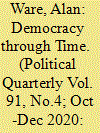

|
|
|
|
|
| Summary/Abstract |
Since the 1980s identities have re‐emerged as a powerful factor shaping support for specific public policies, often doing so at the expense of prioritising the interests of future generations. Outside the United States a major causal factor has been the declining ability of many political parties to mobilise support for themselves and their policies. Consequently, considerations derived from the past can be at the expense of future citizens. This article analyses two major policies separated by a century—Prohibition in the US and Brexit. With both, the enacted policies featured limited previous public discussion about their likely consequences. Moreover, in both cases it was a ‘hard’ version that would be enacted, even though some supporters had favoured more moderate policy options. While not all policies driven by support from particular identities harm future generations, some do. This results from politicians in public utterances previously being insufficiently focussed in detail on the policy’s consequences.
|
|
|
|
|
|
|
|
|
|
|
|
|
|
|
|
| 4 |
ID:
176072


|
|
|
|
|
| Summary/Abstract |
Between public debates about ‘hacking’ elections, so‐called ‘fake news’ and online disinformation campaigns, it has become hard to imagine what free and fair elections in a digital environment could look like. This challenge is particularly pronounced for election observers who monitor free and fair elections. How should election observers fulfil this task when reliable data in online media campaigns are often not even available to media regulators? The following article provides a brief overview of existing challenges around online content regulation and how these apply to elections and election observation. It then considers where resources for digital electoral observation exist and how most effectively to build on these before, in conclusion, discussing next steps and potential opportunities to develop digital election observation further.
|
|
|
|
|
|
|
|
|
|
|
|
|
|
|
|
| 5 |
ID:
176078
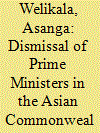

|
|
|
|
|
| Summary/Abstract |
This article comparatively analyses processes of democratic deconsolidation in the Asian Commonwealth states of Malaysia and Sri Lanka by examining two recent constitutional crises in which the head of state dismissed, or attempted to dismiss, the serving prime minister during a parliamentary term. These episodes brought to a close fledgling reform movements that had obtained historic electoral mandates in both countries. The article discusses the Westminster‐derived constitutional provisions concerning government formation as well as the distinctive features of political culture that animate those formal frameworks in the two countries. It is argued that while Malaysia and Sri Lanka possess the formal institutions of liberal democracy that notionally enable both pluralistic democracy and greater democratisation, their political cultures still have sufficient potency to be a counteracting force against the deeper consolidation of constitutional democracy. Democratisation therefore remains a work in progress in both countries.
|
|
|
|
|
|
|
|
|
|
|
|
|
|
|
|
| 6 |
ID:
176085


|
|
|
|
|
| Summary/Abstract |
How is it possible to account for the continuing presence of monarchy in advanced social democracies? Much traditional political science assumes teleologically that monarchies inevitably transform into republics as a higher form of governance. This comparative study of the eight main European monarchies maintains otherwise: monarchy is perfectly compatible with democracy, and can help strengthen citizens’ loyalty to the system of government. Provided it delivers a politically impartial head of state, monarchy can endure indefinitely with government and popular support. In practice, the countries studied are de facto republics, but with hereditary heads of state who occupy social roles beyond the reach of quotidian politics. Monarchy’s principal danger is not republicanism, but the pressures of conflicting expectations about what is required of royal families, and the relentless intrusions of modern media in an age when royalty and celebrity are in danger of being conflated. Responses to Covid‐19 show how monarchs can speak to and for their nations in ways no partisan politician can.
|
|
|
|
|
|
|
|
|
|
|
|
|
|
|
|
| 7 |
ID:
176074
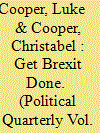

|
|
|
|
|
| Summary/Abstract |
This article analyses the successful Conservative election campaign of 2019 and how it took advantage of a fractured political and economic landscape. It reviews the unique circumstances around the 2019 election and the ‘surprising death’ of a no‐deal Brexit. We then analyse the divergent political communication strategies in the 2017 and 2019 Conservative campaigns showing how the latter was much more coherent and politically unorthodox. Drawing on socioeconomic, demographic and British Election Study data, we argue that Boris Johnson’s messaging was carefully tailored towards the demands of voters in the ‘red wall’ seats. Conservative success was built around an appeal to voters in these economically depressed ‘geographies of discontent’. But while tremendously successful, the coalition this created is potentially fragile. An unconventional, ‘leftish’ Conservative campaign built a new, diverse bloc of voters. It includes a number of left‐wingers expecting change alongside traditional Conservative supporters, and will be hard to keep together given the economic turbulence ahead.
|
|
|
|
|
|
|
|
|
|
|
|
|
|
|
|
| 8 |
ID:
176069


|
|
|
|
|
| Summary/Abstract |
Targeted online ads, algorithmic analytics tools, clickbait‐y social media campaigns, big data voter databases—digital technologies have become a cornerstone of contemporary political campaigns in the United Kingdom. Candidates, party campaigners, and a multitude of other registered campaigners embrace digital campaigning for democratic engagement, mobilising voters and electioneering. Yet, in the wake of the Cambridge Analytica scandal, it has become clear that these technologies are vulnerable to abuse and deception. Pressing issues surrounding privacy, transparency, and human rights persist, and systems of electoral law have become ill‐equipped to enforce good behaviour and compliance with the law. Drawing from empirical evidence ahead of the 2019 UK general election, this article examines systemic obstacles to regulatory innovation. The inquiry provides an analysis of key policy challenges affecting elections and democracy, and develops an analytical framework pathways to regulatory innovation in the digital domain across three dimensions: (1) Institutional structures; (2) organisational processes; and (3) regulatory functions. The article puts forward practical policy recommendations to promote regulatory innovation that is tech‐savvy, evidence‐based and future‐proof.
|
|
|
|
|
|
|
|
|
|
|
|
|
|
|
|
| 9 |
ID:
176082
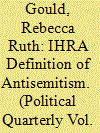

|
|
|
|
|
| Summary/Abstract |
The IHRA definition is one of the most contentious documents in the history of efforts to combat antisemitism. Although it first became well known in the UK as a result of disputes within the Labour Party, the definition reaches well beyond that context, and has been adopted by universities, city councils, and governments. With its intensive focus on the critique of Israel as a marker of antisemitism, the IHRA definition has been heavily implicated in the suppression of Israel‐critical speech in recent years. This article is among the first to adopt a global perspective on the definition—both its history and its content—clarifying the political stakes of this definition and broader paratextual apparatus for a general audience, and provides an explanation of why it should be rejected rather than used to censor Israel‐critical speech.
|
|
|
|
|
|
|
|
|
|
|
|
|
|
|
|
| 10 |
ID:
176068


|
|
|
|
|
| Summary/Abstract |
The regulation of digital technology is gaining increased attention within policy making circles. With growing recognition of the power held by digital media companies and the need to enforce democratic values online, policy makers are reviewing opportunities for oversight. Introducing a special section looking at the regulation of digital election campaigning, this article reviews the case for regulatory reform, the proposed type of regulatory change, and the practice of regulatory innovation. Noting the pace of digital change, it argues that there is a need to think more extensively about the design of any regulatory response in order to prevent systems of oversight becoming obsolete.
|
|
|
|
|
|
|
|
|
|
|
|
|
|
|
|
| 11 |
ID:
176076


|
|
|
|
|
| Summary/Abstract |
Covid‐19 has highlighted our fragile relationship with the planet. But it represents a minor challenge compared to the permanent havoc that runaway climate change threatens. Politicians and governments—some at least—are beginning to recognise the scale of the danger.
In this article we assess the evolution of policy thinking on how to make climate transitions happen; the potential of the European Green Deal; and how progressives need to shape it and any UK counterpart to meet the challenges of modern society. The European initiative arises from a broad coalition spanning the political spectrum. Yet, its central thrust of active government offers the prospect of reviving a battered social democracy. We indicate the openings here for a pluralist, ecological left. The run‐up to the next global climate conference—COP26—will be a vital period which will show whether parties and governments across the world are prepared to meet the climate change challenge.
|
|
|
|
|
|
|
|
|
|
|
|
|
|
|
|
| 12 |
ID:
176079


|
|
|
|
|
| Summary/Abstract |
Many researchers, journalists and politicians are inclined to connect populism and referendums. While in theory the two rest on similar principles, in practice this is not the case. This article shows that populist political elites make limited use of referendums compared both to their rhetoric and to non‐populists. Our findings indicate that the use of referendums is not a reflection of populist politics. They also illustrate how populists may initiate referendums strategically, and they win them quite often. The analysis draws on all sixty‐four national level referendums in Europe initiated by political elites between 2000 and 2019.
|
|
|
|
|
|
|
|
|
|
|
|
|
|
|
|
| 13 |
ID:
176070


|
|
|
|
|
| Summary/Abstract |
This article looks at the regulation of third parties in UK election law. During the 2019 general election campaign, media reports noted an increase in non‐party organisations spending money on electoral advertisements on social media. Such advertisements raised a number of ethical questions, related to spending, transparency, and the content of the messages. Despite such recent concerns, third party electoral activity in the UK is not new, and the existing legal framework regulates campaign spending. That framework has its roots in Victorian‐era election law and has been periodically updated. This article will look at the challenges in designing laws to regulate third party electoral activity, as a difficult line has to be drawn to ensure the laws are effective, while at the same time not imposing too many burdens on independent political activity. Moreover, the move to digital campaigning poses some further challenges, such as monitoring compliance by third party campaigners. While there are no simple solutions to some of the issues raised by third party electoral activity, this article will note some of the measures that could at least improve the transparency of such campaigning.
|
|
|
|
|
|
|
|
|
|
|
|
|
|
|
|
| 14 |
ID:
176083
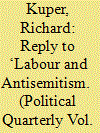

|
|
|
|
|
| Summary/Abstract |
In their 2020 Political Quarterly article ‘Labour and antisemitism: a crisis misunderstood’, Gidley, McGeever and Feldman argue that the Labour Party’s responses to its antisemitism crisis have been misguided because its understanding of antisemitism is wrong. We must look less at cases of individual antisemites and more at the ‘reservoir of stereotypes and narratives’, in which the long (but unacknowledged) history of left antisemitism has deposited its ideas—and from which they can be easily retrieved.
|
|
|
|
|
|
|
|
|
|
|
|
|
|
|
|
| 15 |
ID:
176077


|
|
|
|
|
| Summary/Abstract |
Canada and Australia are two of the economic success stories of the last thirty years, enjoying rapid growth during the 1990s and 2000s and (unlike the UK and US) escaping the worst effects of the 2008 financial crisis. In both countries, however, economic growth has become highly dependent on commodities extraction, leaving them vulnerable to fluctuations in commodity prices, and imposing political constraints on tackling climate change. This article explores the economic and political challenges which the role of the natural resource sector has posed in Australia and Canada in recent years, and examines the contrasting ways in which Scott Morrison and Justin Trudeau’s governments deployed the climate issue in the two countries’ 2019 federal elections.
|
|
|
|
|
|
|
|
|
|
|
|
|
|
|
|
| 16 |
ID:
176084


|
|
|
| 17 |
ID:
176067


|
|
|
|
|
| Summary/Abstract |
the johnson government has no talent for avoiding responsibility for failure. The outbreak of the pandemic should have brought blame‐avoiding instincts to the fore. There were no gains in sight, only losses to be allocated: deaths and economic damage in unforgiving ratios. True, the experts were wheeled out, but they could not be asked to judge difficult trade‐offs. The insistence of the Scottish and Welsh governments on raising their voices should have provided a clue about a workable blame‐avoidance strategy: involve everyone and seek consensus.
|
|
|
|
|
|
|
|
|
|
|
|
|
|
|
|
| 18 |
ID:
176071


|
|
|
|
|
| Summary/Abstract |
The role of new sources of data has become of increasing interest to those involved in political campaigning and a legislative focus of policy makers and regulators. Utilising Karl‐Heinz Nassmacher’s ‘magic quadrangle’ of ‘accounting, practicality, sanctions and transparency’ and a case study of the Political Parties, Elections and Referendums Act 2000 this article unpicks how successful the ‘guiding philosophy’ of transparency was in delivering increased citizen confidence in the democratic process. I ultimately argue that at the heart of all discussions about what regulation in this area should look like, an uncomfortable paradox has to be accepted: that transparency may well help to quell actual instances of malfeasance and the misuse of data, but may at the same time increase citizen distrust in democratic processes. Any regulation should consider the ways in which transparency might be implemented such that it better supports the stated legislative aims.
|
|
|
|
|
|
|
|
|
|
|
|
|
|
|
|
| 19 |
ID:
176080
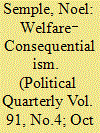

|
|
|
|
|
| Summary/Abstract |
This article is about two ideologies. Welfare‐consequentialism holds that government should adopt the policies that can rationally be expected to maximise aggregate welfare. Populism holds that society is divided into a pure people and a corrupt elite, and asserts that public policy should express the general will of the people. The responses of world governments to the coronavirus pandemic have clearly illustrated the contrast between these ideologies, and the danger that populist government poses to human wellbeing.
The article argues that welfare‐consequentialism offers a vaccine for populism. First, it rebuts populism’s claims about who government is for and what it should do. Second, the pessimism and distrust that make people crave populism can be satiated by successful welfare‐consequentialist government. Finally, welfare‐consequentialism’s sunny narrative of progress can be just as compelling to people as populism’s dark story has proven to be.
|
|
|
|
|
|
|
|
|
|
|
|
|
|
|
|
|
|
|
|
|